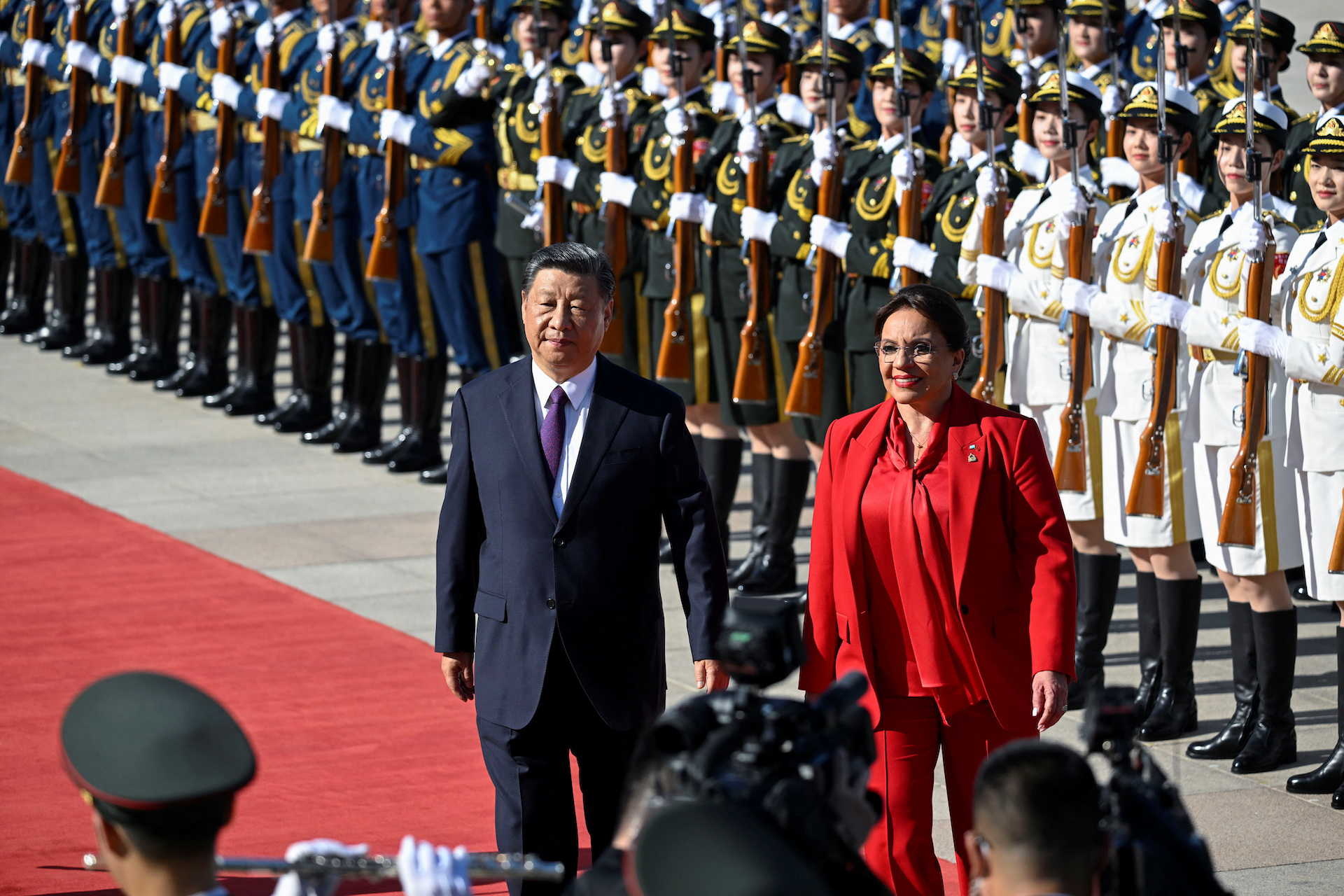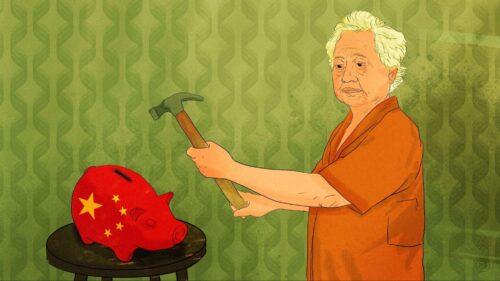Honduran president in Beijing cements official ties
Xiomara Castro is the first Honduran president to pay a state visit to China, after her country switched official recognition from Taipei to Beijing.

Chinese leader Xí Jìnpíng 习近平 and his Honduran counterpart, Xiomara Castro, held their first meeting since the Central American nation switched official recognition from Taipei. Castro, who will wrap up her six-day trip to China today after meeting Xi in Beijing on June 12, is the first Honduran president to pay a state visit to the country.
The People’s Daily, the Communist Party’s house newspaper, heralded the meeting on the front page of its newspaper yesterday (in Chinese). Castro said that Honduras “firmly supports and abides by the one-China principle,” while Xi lauded “a new chapter in the annals of the China-Honduras relationship.”
Both sides released a joint statement (in Chinese) after the meeting, pledging to strengthen cooperation under the Belt and Road Initiative (BRI). The two leaders also witnessed the signing of 17 bilateral agreements in areas including trade, agriculture, technology, and education.
Xi stated that China is willing to begin talks on a free-trade agreement (FTA) with Honduras “at an early date,” and will “promote the early introduction of Honduran specialty products to the Chinese market.”
China and Honduras both inaugurated the opening of their respective embassies this past week to cement official diplomatic ties. On June 9, Honduras also put in a formal bid to join the BRICS-led New Development Bank (NDB), after Castro met with NDB’s president, Dilma Rousseff, at the bank’s headquarters in Shanghai.
Switching ties from Taiwan
On March 26, Honduras formally cut its decades-long diplomatic ties with Taiwan to establish a relationship with the People’s Republic of China (P.R.C.). Chinese Foreign Minister Qín Gāng 秦刚 had met with his Honduran counterpart, Eduardo Enrique Reina, in Beijing, where they signed a joint communiqué establishing official relations.
The Honduran Foreign Ministry released a statement recognizing the P.R.C. as “the only legitimate government that represents all of China.” It added that “Taiwan is an inalienable part of Chinese territory” and pledged “not to have any official relationship or contact with Taiwan,” while noting that Honduras had severed diplomatic ties with Taipei — a requirement for any country that chooses to formally recognize Beijing.
Honduras is now the 182nd country to formally recognize the one-China principle, yet another loss for an increasingly isolated Taiwan, which is now recognized by only 13 sovereign states, nearly half of which are in Central America and the Caribbean. It marks the ninth country to cut ties with Taiwan since current president Tsai Ing-Wen (蔡英文 Cài Yīngwén) took office in 2016.
Taiwan didn’t fork over the funds
On March 13, two days before Castro announced that her country would establish diplomatic ties to Beijing, Taiwan’s Foreign Minister Joseph Wu (吳釗燮 Wú Zhāoxiè) said that Reina wrote to Taiwan with a demand for $2.45 billion in aid. That aid included the construction of a hospital and a dam, as well as debt write-offs for $600 million that Honduras currently owes to Taiwan. But those negotiations came to a standstill.
Honduras is the fourth-poorest country in the Western Hemisphere: Only 87% of the population had access to electricity as of 2016, making the construction of hydroelectric dams a top priority for the Honduran government.
“We need investment, we need cooperation,” Reina said in March, insisting that the switch to Beijing was about “pragmatism, not ideology.”
“Honduras’ needs are enormous, and we haven’t seen that answer from Taiwan,” Reina added.
Chinese investors have become increasingly active in Honduras over the past few years. Sinohydro, a Chinese state-owned company, had already invested $298 million in a first dam, the Patuca III, inaugurated in January 2021 — a project that was originally supposed to have been constructed by Taiwan. In February this year, Castro’s government announced it was negotiating with China for long-sought financing to build a hydroelectric dam called Patuca II.
By the end of 2021, Chinese enterprises had signed contracts worth $640 million in Honduras and completed a turnover of $700 million, according to the Chinese Ministry of Commerce per the Global Times.
“China never ceased its attempts to entice Honduras,” Taiwan’s Foreign Ministry stated when it terminated formal ties with Tegucigalpa. It cautioned against China’s “ostentatious commitments to lure Taiwan’s diplomatic allies into switching diplomatic recognition.”
China’s irresistible FTA carrot
Since the establishment of official ties in March, China has greenlighted the imports of some signature Honduran products such as coffee, shrimps, melons, and bananas. Such exports no longer need to go through Taiwan, and instead can be directly sold to the Chinese market, Fredis Cerrato, the Honduran minister of economic development, told Chinese state-run tabloid Global Times in an interview on June 11. Direct exports of Honduran goods to the Chinese mainland also means “lower costs, faster speed, and more opportunities,” he added.
An FTA with China would help Honduras build a more resilient economy, while opening its exposure to a vast Chinese market. In the first four months of 2023, China’s two-way trade with Honduras reached about 3.89 billion yuan ($540 million), a year-on-year increase of 22.9%. In particular, China’s imports from Honduras grew by 229.5%.
“It is not surprising that Honduras might be interested in diversifying its trade relations to more fully incorporate trade with China, given Honduras’ current overwhelming orientation toward one export market: the U.S.A.,” Rebecca Ray, a senior academic researcher at the Boston University Global Development Policy Center, told The China Project today.
The U.S. is currently Honduras’ largest trade and economic partner, accounting for 33.8% of total merchandise imports and 65% of general assembly imports, according to the U.S. Department of Commerce. In 2021, Honduran exports to the U.S. hit $2.2 billion, which is nearly half (43%) of all of Honduran goods exports and more than six times the $332 million exported to Germany, Honduras’s next largest export market, Ray told The China Project.
“That level of dependence on one export market can lead to economic volatility, as small economic fluctuations in the U.S.A. can have major impacts on economies with such high levels of exposure to it and such low levels of diversification with other trading partners,” Ray added.
Meanwhile, China’s demand for Honduran commodities — particularly seafood — has skyrocketed in the last decade, with China’s fish imports more than doubling from $5.6 billion in 2011 to $13.8 billion in 2021. “The two countries have significant complementarity currently, and their advancing toward an FTA is unsurprising,” Ray added.
Taiwan’s dwindling allies in Latin America and the Caribbean
Since Tsai took power in 2016, China has ramped up its investments in Latin American countries that, in the years following, would nonetheless switch diplomatic allegiances from Taiwan to Beijing. The countries include the Dominican Republic, El Salvador, Panama, and Nicaragua.
Guatemala, Haiti, Belize, and Paraguay are the only countries in the Americas that recognize Taiwan. Paraguay had teetered on the edge during its recent presidential election, but remained allied with Taiwan after ruling party candidate Santiago Peña — who pledged to maintain his country’s long-standing ties with Taipei — took the win. His victory diffused fears that a win by his rival, Efraín Alegre, would cause Paraguay to switch diplomatic allegiances to Beijing.
In January 2023, Ecuador became the fourth Latin American and Caribbean country to sign an FTA with China. China previously signed FTAs with Chile, Costa Rica, and Peru within the past two decades, with Uruguay in line to be next.






